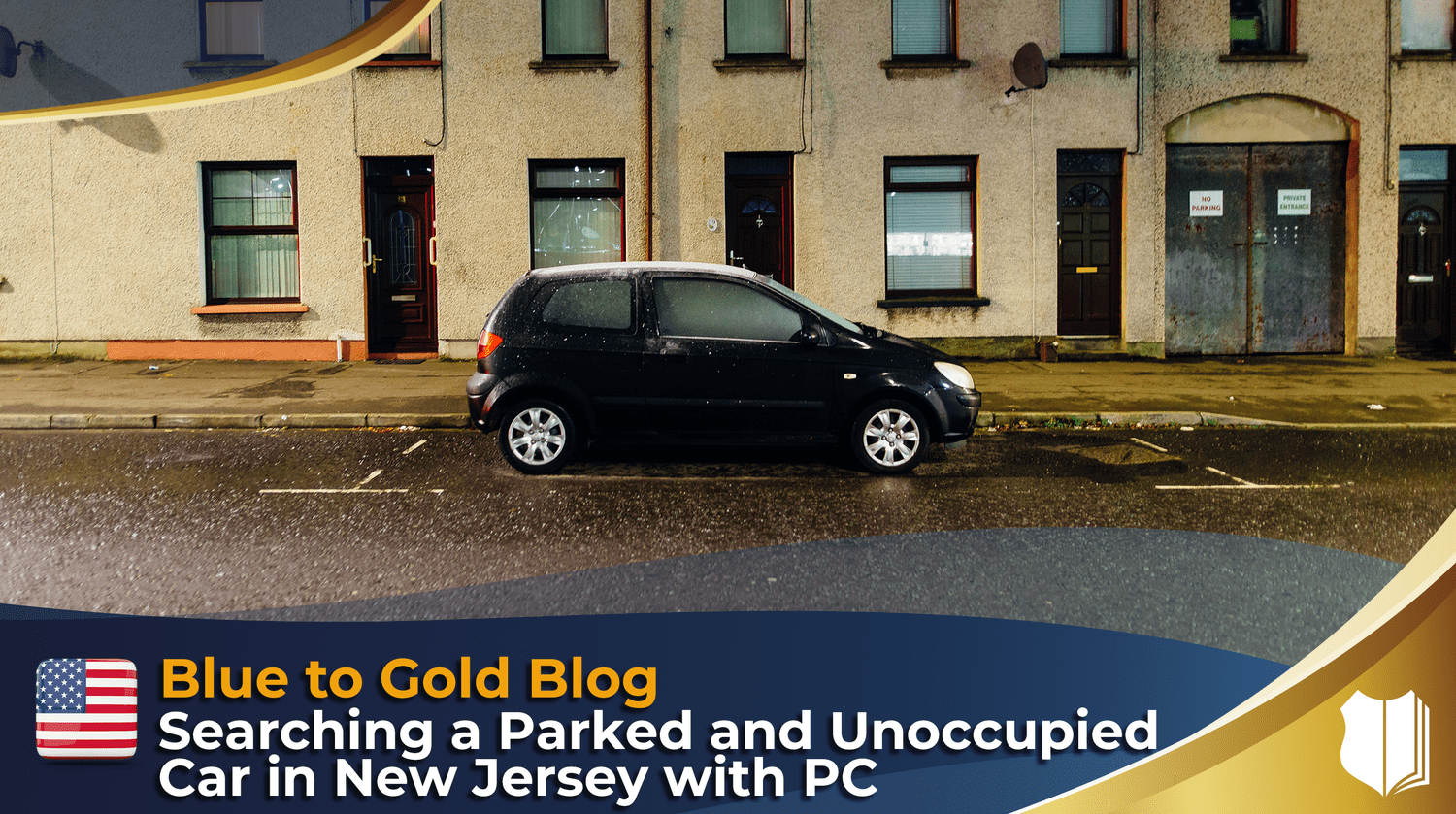Can New Jersey police officers search a parked and unoccupied car with probably cause? Great question.
My name is Anthony Bandiero. I’m an attorney and senior legal instructor for Blue to Gold Law Enforcement Training. I do teach in New Jersey, and I’m a licensed New Jersey attorney.
This answer is obviously going to be kind of tailored to my New Jersey officers. New Jersey does not fully comply and adhere to the Federal Motor Vehicle standard.
You’re about to see this. But maybe you’ll find this interesting, even if you don’t work in New Jersey.
All right. So here’s the situation. My New Jersey officer says, “We had a call for a crime in progress involving burglary and theft. The officers arrived, and they actually catch two people in the act of the criminal activity. So they get there, they have probable cause, their car is nearby, the cops walk over to the car, they look inside the car, and they see evidence of the crime in plain view. Can the officers search the car?”
The officer says, “My understanding is ‘yes,’ based on a case called Witt referenced in your book, “The New Jersey Search and Seizure Survival Guide,” (which Dustin says is awesome, by the way). Then this would be fine, right?”
But other people are saying no, that ain’t gonna work. So let me give you my answer. The answer is: most likely it is going to be lawful to search the vehicle. So let me go to the seminal case on this issue, which is Witt, So basically, Witt overturned a case called Pena Flores in New Jersey, (State of New Jersey v. Juan Pena Flores), which basically said that if you don’t have exigency, you can’t search a car.
Most of the time, generally speaking, cops almost never have real exigency when they search cars. They have the keys. The person’s arrested. Nobody’s trying to grab evidence from the police, right? They don’t have exigency, right? It’s just that they have the car.
Well, in Pena Flores, they wanted an exigency, so you would see cases like cops searching a parked car and getting the evidence suppressed because you can’t do that. There’s no exigency in parked cars, right? Usually, usually. But then you have Witt, which says, “You know what, we’re going to go back to the pre-Pena Flores days.”
And they said here, “We return to the standard set forth in State v Alston, which is a case from 1981 for warrantless searches and searches of automobiles based on probable cause. Going forward, searches on the roadway, based on probable cause arising from unforeseeable and spontaneous circumstances are permissible.”
However, when the vehicles are towed and impounded, absent some exigency, a warrant must be secured. So that’s kind of like the balance that New Jersey wants.
They’re saying, “Look, go do your job, right? If you encounter a vehicle, usually during a traffic stop, and you develop probable cause, take care of business. However, if you know you have probable cause, and you are searching for that motor vehicle, and you have time to go get a warrant, then go get a warrant.”
“We don’t want to give you too much latitude here, we just want to give you enough to handle 99% of the situations that you’re going to confront yourself with. You’re going to run into that 1%, or maybe it’s more than that, where you tow the car back to the station. Guys, go get a warrant for that.”
So what do we need for a search under Witt? Probable cause; it has to be spontaneous; you didn’t really expect to find the car and it’s unforeseen, like you didn’t have the probable cause, yet.
Also, we have some additional cases that have been decided after Witt. All three of these cases, either directly or implicitly, indicate that searching a parked and unoccupied car would be permissible under Witt. I’ll put all these cases below.
Here’s my first case: State versus Serrano. It’s a case out of 2018. Basically, what happened here is a guy robbed a Walgreens. The cops caught him. The cops showed up. The guy’s car is in the parking lot. Now they ended up getting consent from the defendant’s wife. But they also had probable cause. The defendant is saying, “Oh, you can’t search my car. It’s parked and you didn’t really have valid consent” and all this other stuff. But let me just tell you what the higher court said here. “In sum, we agree with the judge that a motion to suppress the evidence seized from the defendant’s automobile and a motion to suppress the victim’s identification would have been futile. In particular, the automobile exception to the warrant requirement applied under Witt.”
Do you see what they just said there? Even though the officers kind of search the car under consent, the court said even if the cops didn’t get consent, they could have searched it anyway under Witt, and this was a parked and unoccupied car. And they also said that the cops got consent as well. So there’s two reasons for searching.
Here is another case called State versus Eustache, a case from 2020. In a footnote, they said, (I’m paraphrasing a little bit), “The motor vehicle exception applies to situations involving parked and unoccupied vehicles encountered by police in public parking lots or on city streets, as well as to moving vehicles stopped on the open highway.” And they’re referring back to a case called State v. Martin, New Jersey Supreme Court 1981. Remember, this is pre-Pena Flores.
Here’s another case: State v. Williams 2021. “The inherent mobility of motor vehicles has long been cited as one of the rationales supporting the creation of the automobile exception” and they’re referring to Witt. So the fact that the car can move is kind of the exigency, even though it might not move. However, in order for the exception to apply, all that is required is probable cause that arose under unforeseeable and spontaneous circumstances that occur here.
In the scenario with the burglars, yes, these cops didn’t know what they were getting into. They didn’t have probable cause rolling up, in time to get a warrant, right? Indeed, our Supreme Court has held that where police have probable cause to believe a vehicle contains contraband or evidence of criminal activity, a warrantless search under the automobile exception is permissible even if the vehicle is parked and unoccupied. Therefore, evidence is not suppressed.
So the case law so far after Witt is in support of searching that vehicle. Now, I have to tell you at the same time, I’m not ignorant of the game, or the the risks that we take here with the New Jersey Supreme Court. If I had a prosecutor who told me, “Anthony, I get what you’re saying, I get it. In fact, you may be right. But here’s where I’m at on this. I just don’t want to lose anything that we already have. I don’t want to have another Supreme Court decision in New Jersey saying, ‘You know what? We’ve changed our mind, we’re going to make it harder for cops.’”
If that’s what the prosecutor is saying to me, I understand. I get those type of arguments. You don’t want to overstay your welcome with the New Jersey Supreme Court. They already have a history of making things very tough on Cops.
But if the prosecutor is saying, “Anthony, there is no support in New Jersey under Witt, for searching that unoccupied car,” then I think that’s inaccurate. Because Witt does not require that the car be stopped as a result of a traffic stop. They didn’t make that a requirement, that it had to only be from a traffic stop.
Now, there’s another thing I want to say before I let you go. There are some cases in New Jersey that would also uphold this under the plain view doctrine. They would say, “Hey, if you can see the evidence in the car, then you can grab it under the plain view doctrine.”
One case is State v. Reininger. It’s a case out of 2013. And it said basically, (I’m paraphrasing here), “But to satisfy the plain view exception to the warrant requirement, officers just need three things. The police officer must be lawfully in the viewing area, can be lawfully present; the officer must discover the evidence inadvertently, meaning he didn’t know the evidence was there in advance; and three, it has to be immediately apparent to the police at all times in plain view. And in this case, that is what the court found is all that’s required to enter the car under plain view.
I have to let you know that the court is dead wrong on that. Plain view and plain view seizure are two different things. Under this logic, you could go past somebody’s window in their house and see a kilo of cocaine on the kitchen table in plain view, and then just go into the house and seize it.
No, you can’t. That doesn’t get you into the house. You have to have another constitutional authority to get into the house, to get into the car. Well, normally, if you see things in plain view, how do you get into the car? The motor vehicle exception, not plain view! The plain view doesn’t get you into the car. The plain view only gets you the probable cause! So if there’s a prosecutor out there watching this, and you are basing your logic on using plain view I think you’re making a mistake there. I think your better argument is to stick with the motor vehicle exception.
All right. I hope this has helped. You can go to: bluetogold.com/show and ask me a follow-up question. I try to do a good job on keeping track of those. All right. I hope this has helped you get it right every single time. Until next time, my friends stay safe. Thank you.











